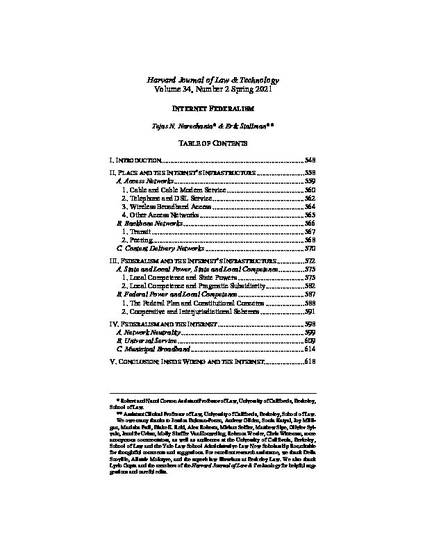
Article
Internet Federalism
Harvard Journal of Law and Technology
(2021)
Abstract
The internet is not a cloud. Rather, it is a series of real cables, wires, radio links, and switches connecting places that employ real people and house real computers. Each of these components of the internet’s infrastructure operates in a distinct locale and is subject to distinct market constraints.
This basic yet significant descriptive insight has important implications for regulatory cooperation and competition between state and federal authorities regarding broadband internet access. In the various battles over network neutrality regulation, for example, state authorities and federal regulators, have found themselves at odds over the scopes of their respective authority.
So where on the internet does state power end and federal power begin? The long history of competition and cooperation among, local, state, and federal communications regulators suggests a tradition—incomplete and imperfect in places—of a pragmatic approach to subsidiarity, locating decisional power at the most immediately salient local jurisdiction. Such an approach can—and should—inform the allocation of shared regulatory authority over the internet’s infrastructure and services, too. The internet is not one grand, monolithic, interstate thing, immune from state and local regulation under the dormant commerce clause, doctrines of federal preemption, or related limits on such power. Rather, whether states and localities may (and should) regulate depends on technical specifics and regulatory effects. Hence, where local concerns predominate, local authorities may be our most competent regulators; and where federal concerns predominate, federal authorities should take the regulatory reins. Such a pragmatic approach yields important lessons for regulatory power online. Some aspects of internet service require a local touch. Others do not. But identifying an appropriate site for resolving such policy matters demands a close understanding of the technical, market, and regulatory structure of the communications networks that form the modern internet.
Keywords
- internet,
- federalism,
- broadband,
- state,
- local,
- regulation,
- net neutrality,
- universal service,
- municipal broadband
Disciplines
Publication Date
Spring 2021
Citation Information
Tejas N. Narechania and Erik Stallman. "Internet Federalism" Harvard Journal of Law and Technology (2021) Available at: http://works.bepress.com/tnarecha/20/
